Hong Kong off the Beaten Path – 10 Insider Tips
Latest update: January 18, 2023
Hong Kong is an incredibly multifaceted city, and even after several weeks there’s alway something new for you to discover. Most tourists visit the typical sights in Hong Kong such as Victoria Peak or the Big Buddha. But Hong Kong has a lot more to offer.
And that’s where we want to take you with this post.
Our Hong Kong insider tips will help you discover corners of the city that visitors rarely get to see.
You’ll get to know a completely different side of the city and you’ll grow to love it even more.
We’ll show you exciting places in Hong Kong off the beaten path and give you mouthwatering restaurant tips, because Hong Kong also happens to be a paradise for foodies.
If you’re looking for a place to stay, then check out our post with all our Hong Kong hotel tips.
#1 Photogenic residences
Housing prices in Hong Kong are amongst the most expensive in the world. It’s completely normal to pay around 3,000 euros per month for a small apartment of about 40 to 50 square meters.
Space is an expensive commodity in Hong Kong and so the building style is generally tall and narrow. Whenever we walked the streets, we were amazed at the huge facades of buildings with hundreds, if not thousands of people living inside.
There are an unbelievable number of subjects for photographers here. Just keep your eyes open while you explore Hong Kong and don’t forget to look up every now and then.
You’ll be surprised at all the things you can discover there. We’d like to present two special buildings to you in more detail because we were particularly impressed with them.
Choi Hung Estate
Choi Hung Estate is a large residential complex consisting of numerous residential blocks, shops, sports fields, and schools.
The basketball courts on the roof of a two-story parking garage tucked in between the high-rises are particularly photogenic. They’ve become really popular as a photo spot, especially for local girls who flock there in droves to pose and take pictures like crazy.
Choi Hung Estate is huge and the basketball courts aren’t that easy to find. Just look for a flight of stairs leading to the top of a parking garage.
If you’re having trouble finding them, just check the Google Maps satellite view – they’re easy to spot there.
2 Tse Wai Ave
Take the subway to Choi Hung (exit C3 or C4).
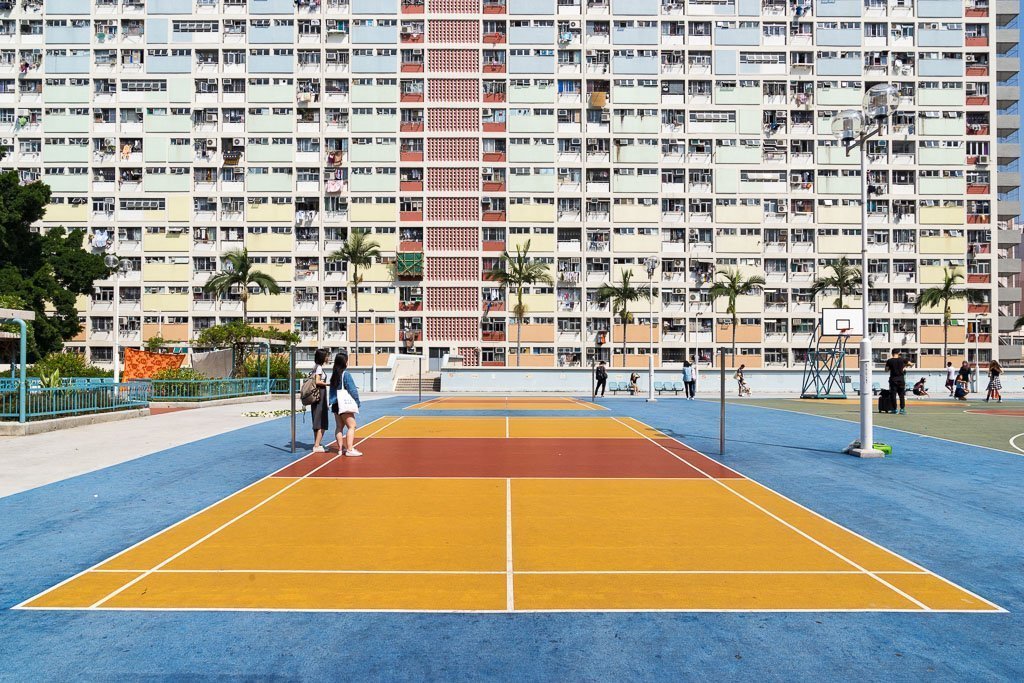
Montane Mansion
Montane Mansion perfectly encapsulates the architectural style of Hong Kong. Arranged around a narrow courtyard, the walls of the complex rise up on three sides.
It’s a tight space, the residents hang their laundry out their windows to dry, and you can see older Hongkongers sitting at the sides, drinking tea, playing mahjong, or just chatting.
The building even gained international fame after being featured in an explosive scene in Transformers: Age of Extinction.
Please note: If you want to take pictures of typical residential buildings in Hong Kong, please remember that they aren’t tourist attractions, and photography might even be restricted in some places. If in doubt, we’d rather miss out on a picture than be disrespectful.
1028 King’s Rd, Quarry Bay
Take the subway to Tai Koo (exit B). Or take the tram to Mount Parker Road – it stops right outside the building.
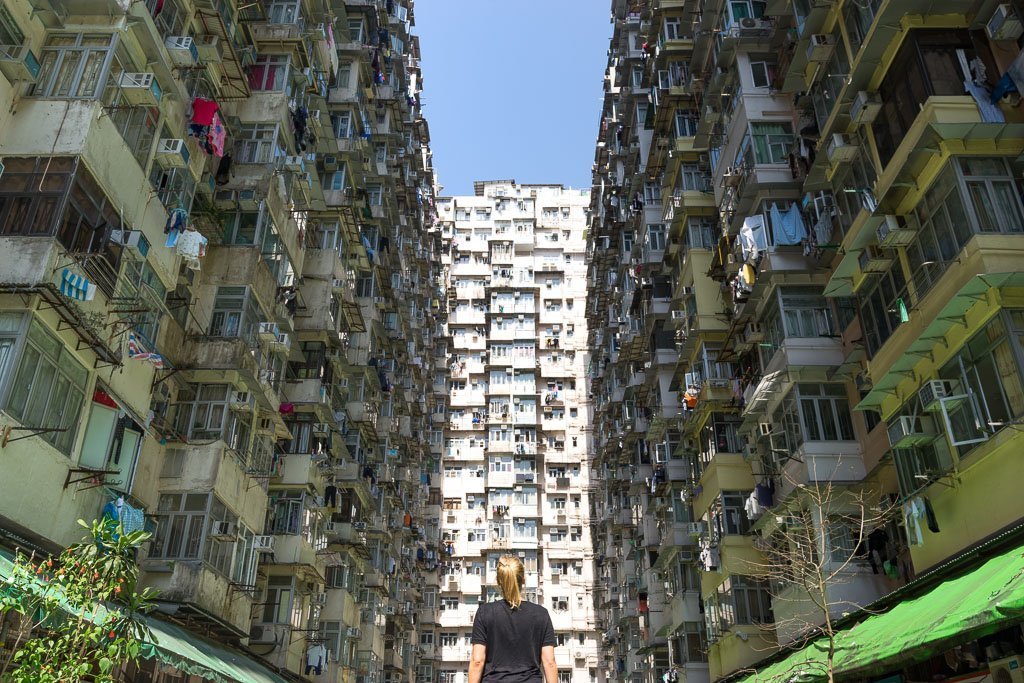
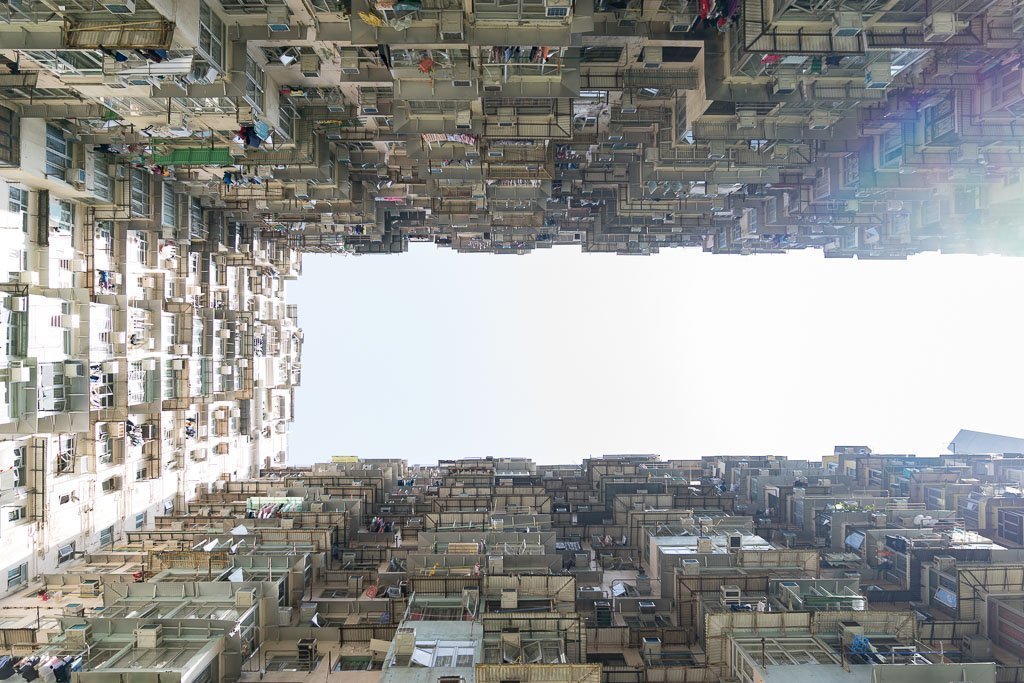
#2 Pei Ho Street Market
Pei Ho Street Market in the district Sham Shui Po is a real insider tip. The district is considered the poorest in Hong Kong, although it isn’t far away from the flashy shopping malls and skyscrapers.
Getting to the market building is already an experience in its own right. The surrounding streets are a gigantic market area where you can buy anything from food and fashion to trinkets and talismans.
The market building itself extends over two floors. The downstairs area is reserved for butchers and fishmongers, while the upstairs area mostly sells fruit and vegetables. We didn’t see any other tourists while we were there.
Pei Ho Street Market is definitely not recommended for the faint of heart, especially if you’re squeamish about butchery. Because nothing gets wasted here – you’ll find everything on sale from head to tail and anything in between.
The fish section is particularly hardcore: The fish are killed and gutted on the spot. It ain’t pretty, but it’s definitely authentic.
333 Ki Lung Street
Take the subway to Sham Shui Po (exit A2 or C2).
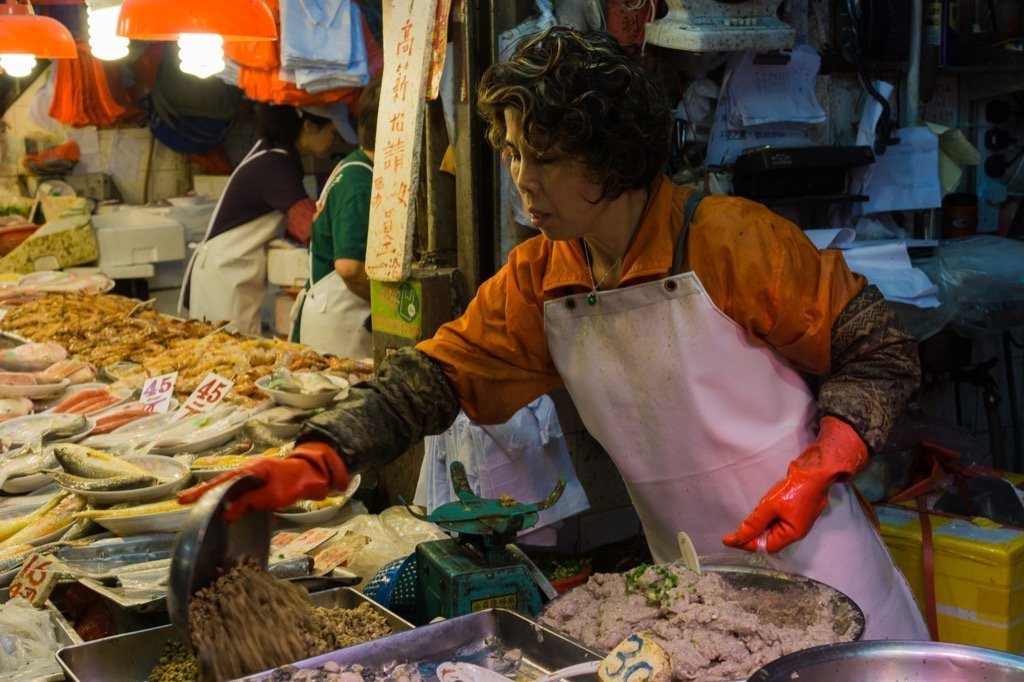
#3 Chungking Mansions
Chungking Mansions is a tower complex built in 1961. There’s hardly another place in Hong Kong that’s such a melting pot of different cultures and people.
Its narrow hallways contain everything from budget accommodation for travelers to stalls offering food from all over the world to traders of all things imaginable – both legal and illegal.
Businesspeople from all parts of Asia and Africa meet here to trade in electronics and other goods. The anthropologist Gordon Matthews has been studying the building for many years.
According to his estimates, 20% of all cellphones in southern Africa can be traced to Chungking Mansions. The building is interesting for visitors who want take a peek behind the facades of Hong Kong.
You can stroll through the hallways, eat a delicious Indian curry, and witness the hustle and bustle. Chungking Mansions also offers a variety of simple accommodation at relatively low prices. The rooms are very simple, but generally quite ok.
36-44 Nathan Rd
Take the subway to Tsim Sha Tsui (exit E).
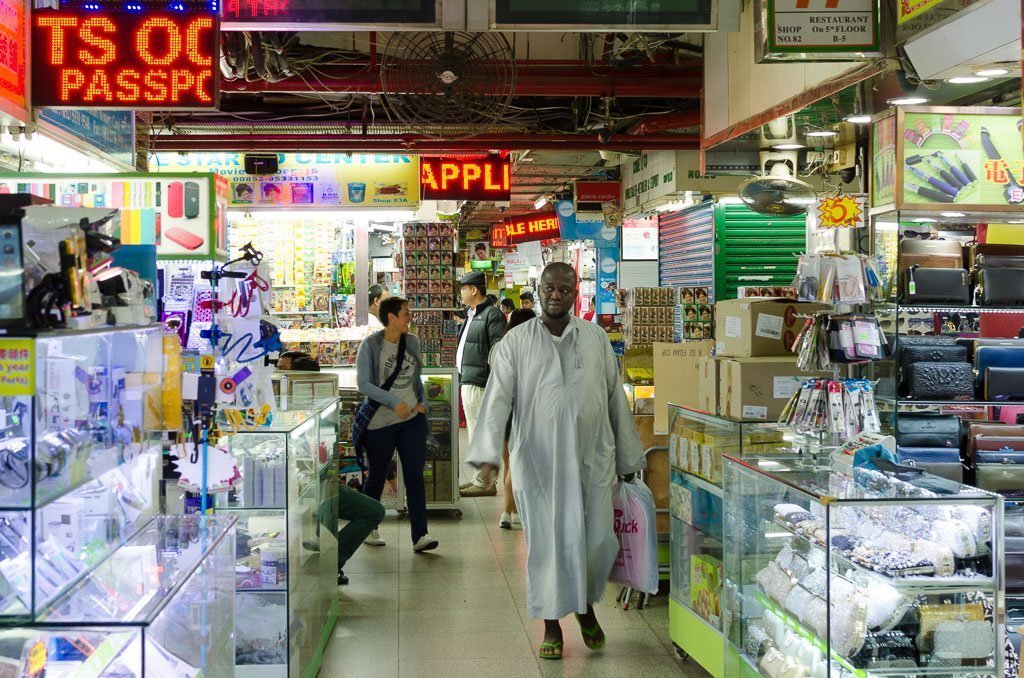
#4 Shek O
If you want to escape the hustle and bustle of the big city, then Shek O is the place for you. This small fishing village on the southeastern tip of Hong Kong Island will make you feel like you’ve entered another world.
Everything is so much smaller: The houses are small and the streets are more like alleyways. Every now and then a car putters past or you might encounter the odd pedestrian.
The more than 200-year-old village is the exact opposite of the city. But it’s still part of Hong Kong. There’s also a sandy beach where the locals go for a swim, especially on weekends.
Don’t worry if you forgot to pack your swimsuit for your city trip to Hong Kong – you can buy everything locally at fair prices before you hit the water.
Take the MTR Island Line (blue line) to Shau Kei Wan. From there, take bus number 9 and get off at the last stop, Shek O.
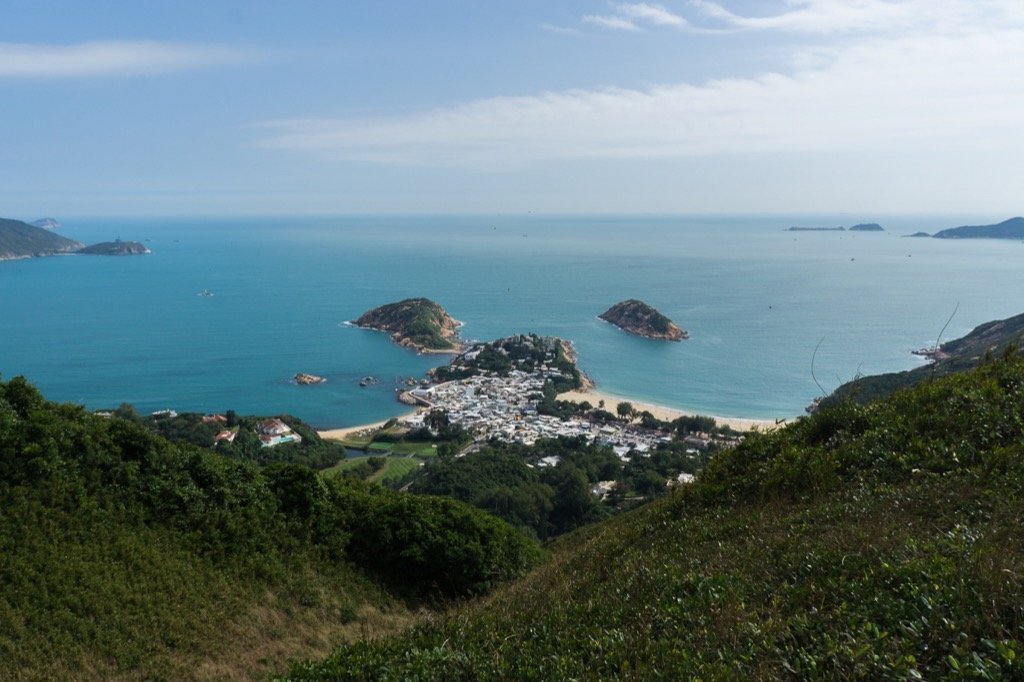
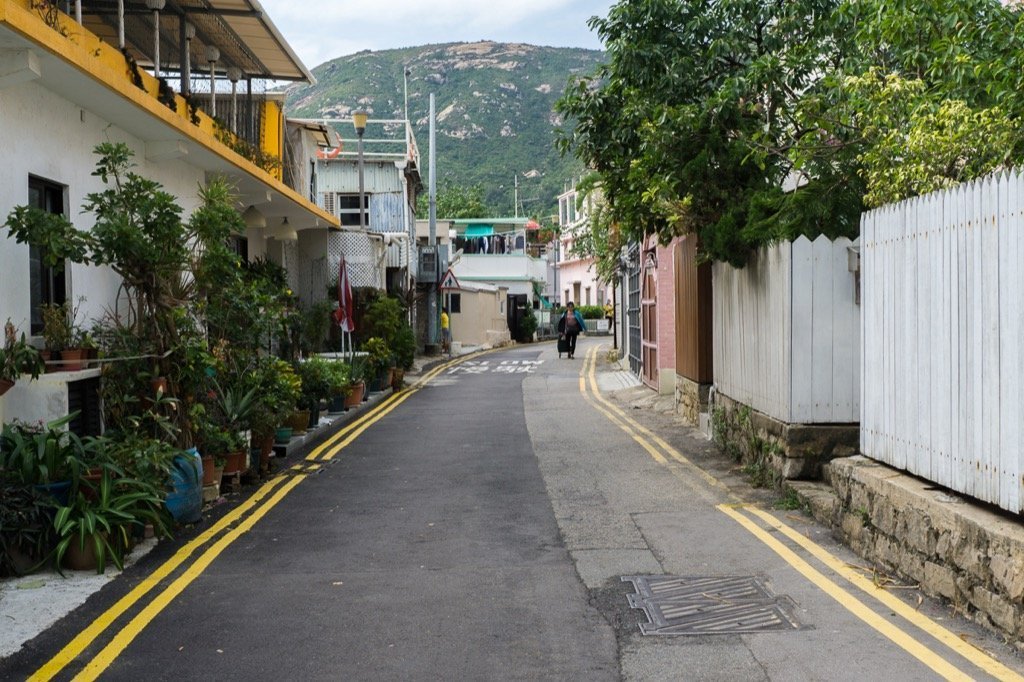
#5 Horse racing
We heard about the horse races in Hong Kong by chance and thought we’d check it out. The Happy Valley Racecourse is nested in a clearing between blocks of high-rises.
Every Wednesday (except in August) from 7 pm, the racecourse becomes the scene of a huge spectacle.
Mainly inhabitants of mainland China and foreigners living in the region gather here to blow their money on the races. This is because while gambling is forbidden on the mainland, it’s legal in Hong Kong, and the Chinese just love to gamble.
In the 2016/17 racing season, a total of 115.8 billion dollars were bet here. Or written out in full: 115,800,000,000. Crazy! But you can still have fun on a small budget because bets start at 20 HKD (around 2 euros).
The races themselves are over really quickly, but it’s still worthwhile to soak up the atmosphere. Admission is a symbolic 10 dollars (about 1 euro) for the standing-room area at the racetrack level.
Wong Nai Chung Rd
Either by tram (stop: Colonial Cemetery), or by bus or taxi.
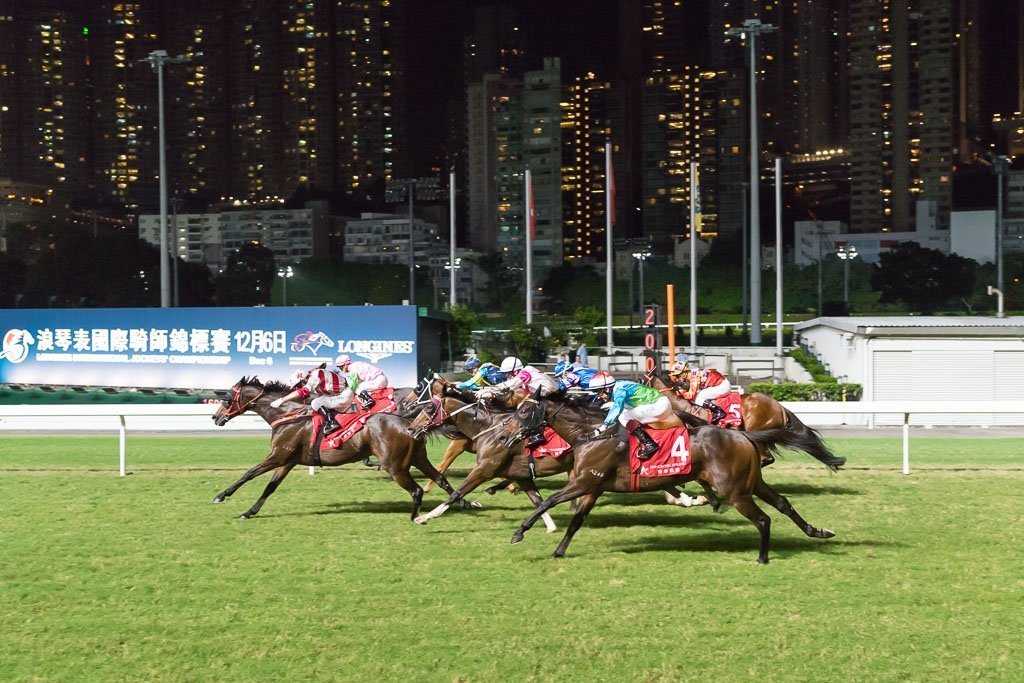
#6 Cattle Depot Artist Village
The Cattle Depot is a former slaughterhouse that’s been repurposed by artists. The flat red-brick buildings look completely out of place in Hong Kong. You’d expect to find a place like this in London or Berlin, but hardly in a typical Hong Kong residential area.
Compared to similar places in Europe, the Cattle Depot Artist Village isn’t all that spectacular though. There are a few studios, and from time to time a few exhibitions or theater performances are held here.
There’s no need to travel halfway around town to see this place. But if you happen to be in the neighborhood or you’ve run out of things to see, then the Cattle Depot is a great insider tip.
63 Ma Tau Kok Rd
The Kowloon City Ferry Pier is very close by. There are also about 12 buses that stop at H.K and China Gas, which is right next to the Cattle Depot.
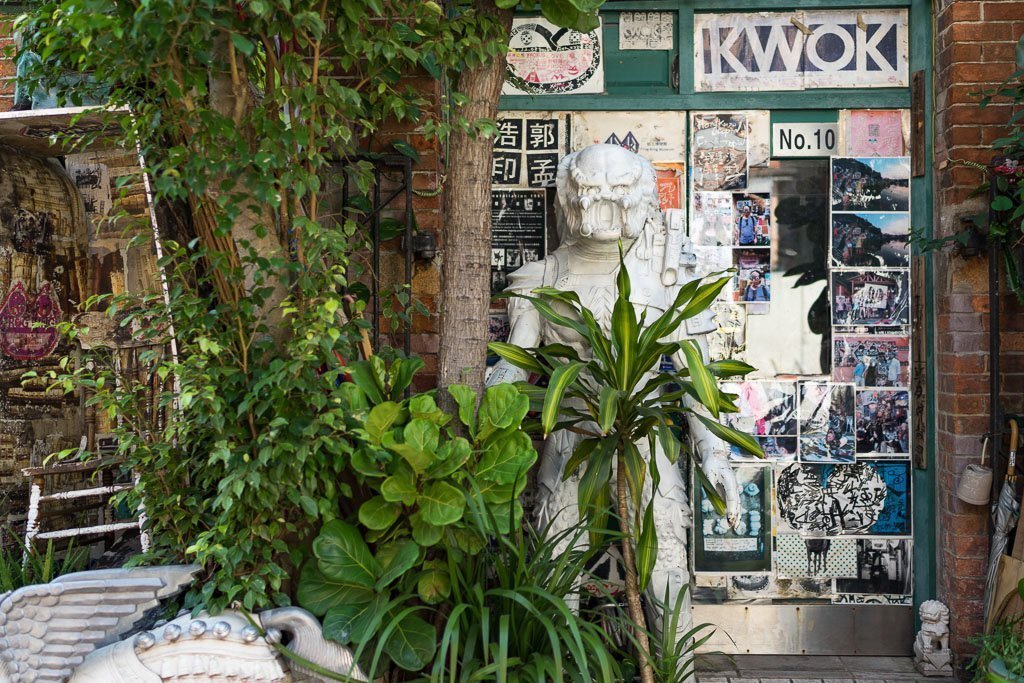
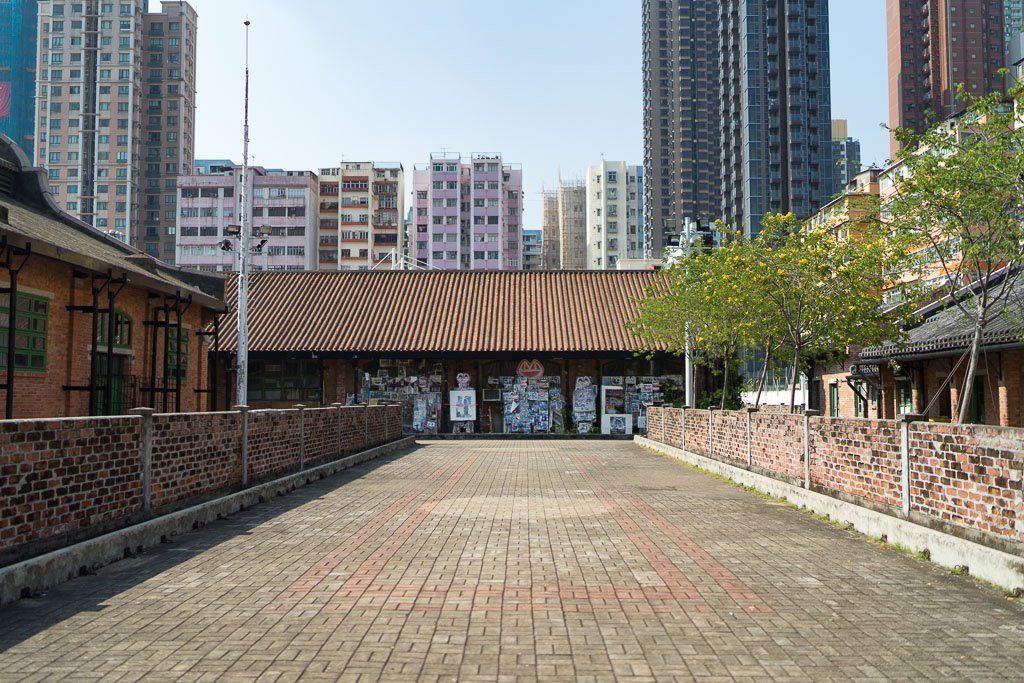
#7 The best dim sum
Where to get the best dim sum in Hong Kong is a hotly debated question on par with the great Wiener schnitzel debate in Vienna. Dim sum is a mainstay of Chinese cuisine.
The steamed or sometimes fried dumplings come with a variety of fillings, the most popular being pork and shrimp.
Many people swear by Tim Ho Wan, which has four branches in Hong Kong. The restaurant even has a Michelin star, but to be honest, we weren’t that impressed. The atmosphere is very sterile and gives off more of a cafeteria vibe, and the dim sum didn’t really live up to its reputation in terms of flavor either.
Our favorite restaurant in Hong Kong is definitely the DimDim Sum Specialty Store. The dim sum there is so great that we ate here three times. You’re given a piece of paper where you have to mark which dim sum you want.
The prices range between 15 and 25 HKD per serving, which includes 3 to 4 dim sum each. 20 euros should easily buy you ample dim sum for two. But don’t expect a cozy restaurant.
Like so many restaurants in Hong Kong, everything here is fast and efficient. You come, order, eat, pay, and then leave. But you’ll be happy you did.
Our favorites were the rice rolls with shiitake mushrooms and black truffles, the Shanghai soup dumplings with black truffle, and the traditional siu mai with a quail egg.
10 am to 1 am
There are several branches. We always went to the restaurant on 26-28 Man Wui Street.
Take the subway to Austin (exit B5 oder A).
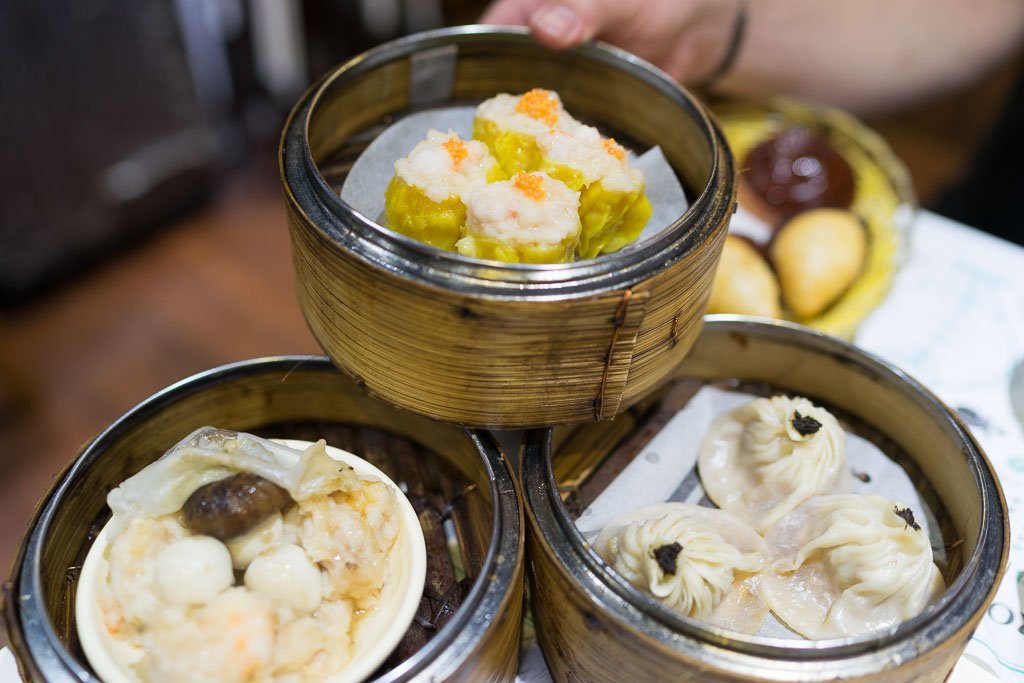
#8 The best rice rolls
Rice rolls are another typical Chinese dish. The somewhat slimy rolls made of rice noodles come with a variety of fillings and are served with soy sauce, chilli sauce, and a sweet sauce.
The small, inconspicuous Hop Yick Tai is famous for its rice rolls and is also recommended by the Michelin Guide.
For less than a euro you can get a portion of rice rolls and eat them on the go or at one of the rickety metal tables inside the eatery.
6:30 am to 8 pm
121 Kweilin Street
Take the subway to Sham Shui Po (C2)
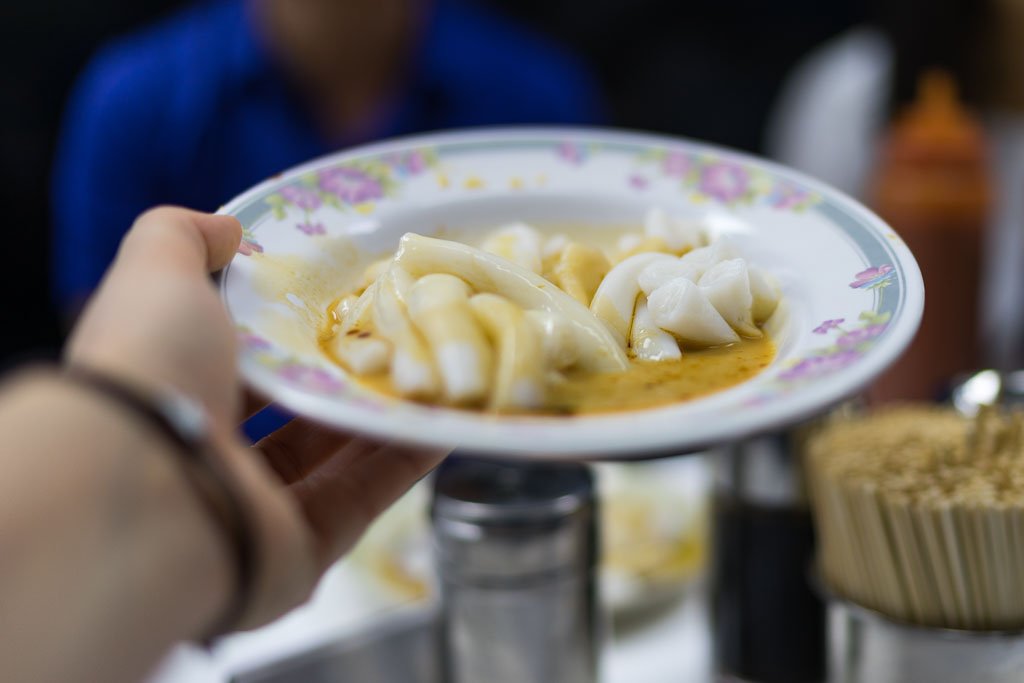
#9 International restaurants
The great thing about Hong Kong is that so many nations live here together and all add their own flavors to the city. We didn’t just try the Chinese cuisine, but also had very tasty Vietnamese, Japanese, and Indian food.
If we’d wanted to, we could have even had German specialties such as ham hock with sauerkraut. But we didn’t.
We can recommend the following international restaurants in Hong Kong:
Ichitora Ramen: This small restaurant serves very tasty and authentic ramen, the typical noodle soup from Japan. We learned to love it on our trip to Japan and it really tasted exactly like in Japan here. The small shop is located in a side street off of the Mid-Levels Escalator. If you go up the escalator, the restaurant is on the right-hand side.
Mo-Sa: noon to 3 pm and 6 to 10 pm
Tsung Wing Lane, SoHo
BEP Vietnamese Kitchen: We’re also big fans of the Vietnamese noodle soup pho, and of course no place does it better than the street vendors in Saigon. But the BEP Vietnamese Kitchen comes pretty close to the original, and especially the very high-quality and tender meat in the Pho Fillet Hanoi was actually much better than you typically get in Vietnam.
Noon to 4:30 pm and 6 to 11 pm
Tsung Wing Lane, SoHo
#10 Sky bar without a dress code
Hong Kong is known for its countless rooftop bars and terraces. Most of the bars are very exclusive, there’s a strict dress code, and the drinks will cost you an arm and a leg.
But there’s a great alternative: There’s a huge, freely accessible roof terrace on the roof of the IFC Mall. The Red Bar is located here, where you can enjoy a great view of Kowloon over an affordable drink.
But even the most budget-conscious travelers will get their fill here, because a large part of the roof terrace is a public area. That means you’re welcome to just sit down and relax with a beer from the supermarket and enjoy the view.
Hong Kong may have roof terraces with more spectacular views, but this is by far the most affordable. That makes the IFC Mall a real insider tip among the many sky bars in Hong Kong.
8 Finance Street, Central
The mall is located right across from the Central Ferry Piers.
What are you insider tips for Hong Kong?
That wraps up our 10 insider tips for Hong Kong. Perhaps you have a good tip for us? Then please let us know in the comments!
Your trust is important to us: This post features the best tips we collected over two stays in Hong Kong. The first time we were traveling independently, and the second time was part of a paid cooperation with Cathay Pacific. But as you know by now, our opinion isn’t for sale and all the tips in this post are unbiased and honest.
